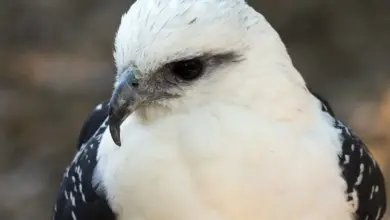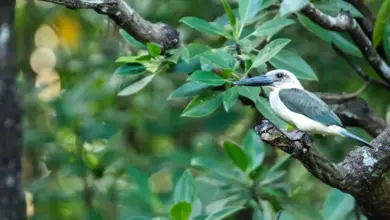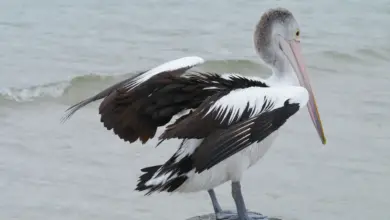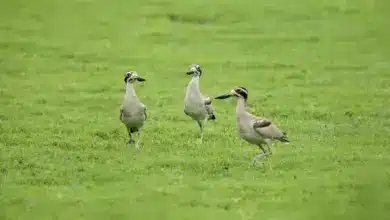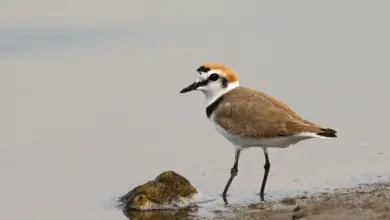Can Birds Eat Maggots?
Maggots are yucky, but they are also a good source of protein. So, can birds eat maggots? What do they taste like?
Yes, birds can eat maggots.
And although it seems that there is a huge amount of conflicting data on the subject floating around, we can assure you, that birds are perfectly safe eating maggots. In fact, maggots are a healthy treat for birds.
Just think for a moment, if a bird is eating a maggot, it has millions of years of evolution behind that decision.

So, what really are maggots?
First, let’s talk about what a maggot is. Simply, it is a baby fly in its larvae form. There are over 90,000 species of adult flies and they all vary in size and color.
So that’s a lot of opportunity for a food source if one is willing to chow down on them.
Other names for maggots are larvae or grubs. They all mean the same thing. It’s just when you say “I am feeding my birds larvae or grubs”, it doesn’t sound as yucky as “I’m feeding my chickens some maggots”, right?
But maggots are a goo as they naturally “upcycle” nutrients from organic matter including dead animals and other organic matter like feces (poop). Yum!
And this is where the “yuckiness” of maggots comes to be, because of what they eat, not because they aren’t delicious or a good source of protein for a very wide variety of animals including livestock, fish, reptiles, and even cats, and dogs.
And in case you’re already wondering, a dried maggot has a peanut flavor which isn’t too bad but has a strong aftertaste.
Are maggots good for birds?
But all of this negativity is changing, and fast. This is all due to the fact that both fish meal and soybean prices are continuously rising, making it more expensive to farm livestock and other animals bred for consumption like shrimp and prawns.
In fact, an innovative company in the UK, Better Origin, is already creating systems that work with farms and animal breeders by creating maggot “factories”.
You simply place waste like manure, rotting food, or other farming byproducts as food for your grubs, thus creating a Carbon-negative animal feed grown directly on the farm, saving over 574 tons of CO2 a year.
And it’s all hands-off for the user. Their product is an “AI-powered insect mini farm built in a shipping container unit, growing larvae using food waste.”
And if you take a look at Amazon right now, you’ll see plenty of “Fly Larvae” or “Fly Grubs” for sale as food for all sorts of animals.
And at around $5 per pound or more, it might be a good idea to start farming them yourself.

So why all the false information around maggots?
People not doing their research and not basing their conclusions on facts, pure and simple.
Science has shown time and time again that maggots are a great, safe source of protein for farm animals as well as fish and many other domesticated animals.
And the amount of waste they dispose of in the process of eating also dramatically decreases the number of greenhouse gasses put out into the environment through natural decomposition.
Meal Worms vs. Black Solider Fly Larvae For Wild Birds
Okay, now that you know all the benefits of maggots, what do the actual birds prefer to eat? Which creepy-crawly suits their taste buds most: Mealworms or Black Soldier Fly larvae?
An eco-friendly company called Enterra decided to find the answer to that exact question.
They created a study reaching out to FortWhyte Alive in Canada, a nature reserve and education center that teaches sustainable farming as well as a host of other programs.
Enterra asked them to reach out to their “birder” members and see who would be interested in participating in their study.
Tom Goldsborough, an avid birder answered the call and conducted a survey of his backyard feeders to determine whether songbirds preferred black soldier fly larvae over mealworms.

What he found was that at the beginning of the offering, most birds ignored the batch of maggots and ate the mealworm. But by the end of the study, the inverse was true. The birds were eating the maggots and ignoring the mealworms.
He concluded that the birds weren’t familiar with the maggots at first, but once they tried them, their preference went to the larvae.
He states how this makes total sense as maggots are high in protein and fat, and in his part of Canada, the temperatures were minus zero.
The birds would eat whatever gave them the most nutrients they needed to fight the cold and survive. And it was clear the larvae had more bang for the buck.
These studies also suggest that if you start offering Black Soldier Fly grubs in your feeders you can also start attracting a more varied variety of bird species.
And as far as feed for wild birds goes, maggots are much harder to handle than fragile meal worms. That means they’re easier to pack, ship and store. And they’re cheaper than mealworms.
Just a few more reasons to start feeding your birds maggots.
If you want to know more about feeding maggots to birds, you should check out this great podcast.
What else eats maggots?
How about your dog, cat, pet lizard, cows, fish, and chickens just to name a few? They’ve all been eating maggots for years whether you realize it or not. And chickens are birds, right?
In fact, most research, as far as maggots being a sustainable food source, has all been in the pursuit of finding a replacement for soy and fish meal in the feeding of poultry by poultry manufacturers.
Again, poultry means bird.
But maggots aren’t just for birds any longer. Did you know maggots are already used in many animal feeds including dog and cat food?

Other studies around feeding maggots to birds
The environmentally friendly company Enterra already has contracts with dog and cat food manufacturers in Canada and the USA.
Their larvae (maggots) have already been approved and deemed safe by the Canadian Food Inspection Agency, and the FDA in the USA for adding to animal food products.
Further research has shown conclusively that maggots “can effectively be used as an alternative protein source in tilapia fingerling production.” https://www.sciencedirect.com/science/article/pii/S1095643307008781 with no harmful side effects to the fish or difference in taste.
However the largest scientific data pool has definitely been around the use of maggot meal in poultry farming.
With the continuing rise of poultry foods and additives, many studies have been going on to find a cheap way to feed the world’s billions of chickens.
Studies have concluded that maggot meal in commercial chicken farming is 86% cheaper to produce than fish meal additives.
That’s a saving of billions annually in the commercial poultry market. And of course, this doesn’t include turkeys, squab, and other game birds raised as meat.

Environmental benefits of feeding maggots to birds
But that’s just one of the benefits of using maggots to feed birds.
The same study suggests a commercial farm of 20,000 chickens produces enough manure and other organic waste to sustain the maggot production needed for such a large-scale farm.
So if you combine something like Better Origin’s breeding system with the farm’s own organic materials, there is a further cost reduction due to nothing being manufactured, shipped, and handled. It’s all on-site. Fewer employees, less gas, less gear, less everything.
But there’s more. Consider “Clarisse et al. (2009) reported that ammonia released from decomposition of livestock wastes could account for 39 percent of the total amount of ammonia in the atmosphere.“
That’s a massive amount. And this doesn’t even include the industry’s numbers on their CO2 output. “This is true, in part, because livestock and poultry manures are an important source of GHG emissions.
In addition to methane and nitrous oxide, ammonia is also produced from animal manures.”
So, can birds really eat maggots – wrap up
So simply by lowering your feed costs using waste already on your farm and some maggots, a poultry farm can become more profitable and help save the environment all at the same time!
So why isn’t this happening yet? Sadly, I have no idea.
But I bet it has to do with all the misinformation out there about maggots and maggot meals, and how first-world countries tend to view maggots as disgusting little creatures instead of seeing how beautiful and beneficial (and tasty for birds) they can really be.

